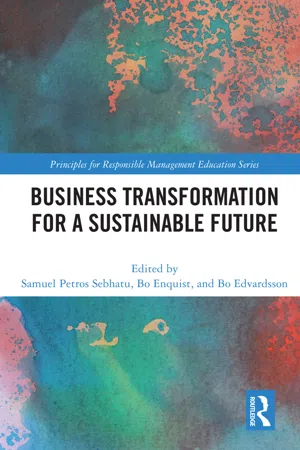
Business Transformation for a Sustainable Future
- 256 pages
- English
- ePUB (mobile friendly)
- Available on iOS & Android
Business Transformation for a Sustainable Future
About this book
Interconnecting the concepts of sustainability, innovation and transformation, this book explains how organizations have successfully transformed themselves and wider society to foster a more sustainable future, and identifies the difficulties and challenges along the way. Part of the Principle of Responsible Management Education (PRME) series, the book promotes a strong voice for meeting sustainability challenges for transformative change in a globalized world through business education and practice.
A transition to a more sustainable way of doing business can only be attained by combining technology with profound system innovations and lifestyle changes. The chapters in the book, each written by a strong and well-recognized team of researchers in the field, open up the discussion about a new partnership between sustainability, innovation, and transformation that includes the global society (big world), the biosphere (small planet), and also requires a deep mind shift. The book presents cases from business (including Ikea and Eataly) and other service networks including the Base of the Pyramid (BoP), and illustrates how these organizations have transformed themselves for a sustainable future. The research perspectives are macro (policies and legislation), meso (institutional practices) and micro (business practices and individual behavior). This book is where research meets real-world business and societal practice. The chapters are grounded in business research, specifically the interdependencies between sustainability, innovation, and transformation, which makes for a robust basis for describing, explaining, and understanding the complex challenges faced by business and society in the 21st century.
The book is intended for graduate- and postgraduate-level students and executive education with implications for practitioners. Furthermore, it contributes to multidisciplinary research in the field of interaction between business and society with a view to extending the firm-centric view to encompass a broader, systemic, and dynamic understanding of business and societal transformation.
Frequently asked questions
- Essential is ideal for learners and professionals who enjoy exploring a wide range of subjects. Access the Essential Library with 800,000+ trusted titles and best-sellers across business, personal growth, and the humanities. Includes unlimited reading time and Standard Read Aloud voice.
- Complete: Perfect for advanced learners and researchers needing full, unrestricted access. Unlock 1.4M+ books across hundreds of subjects, including academic and specialized titles. The Complete Plan also includes advanced features like Premium Read Aloud and Research Assistant.
Please note we cannot support devices running on iOS 13 and Android 7 or earlier. Learn more about using the app.
Information
1 Business transformation for a sustainable future
Setting the stage
- Real cases from business and other service networks;
- Illustrations of how these organizations have transformed themselves, and the society in which they operate, into a sustainable future;
- Identifying the difficulties and challenges that businesses are facing while undertaking their transformation;
- Academic research and theories from a broad range of areas;
- Research perspectives that are macro (policies, legislation), meso (institutional practices), and micro (business practices and individual behavior) and how these are intertwined;
- Its usefulness as a teaching resource (graduate and postgraduate level).
With less than 4000 days remaining until the 2030 marker, we need to turn commitment into action. As we set out to recover from the COVID-19 pandemic, now it is the time for all companies to raise their ambition for people, planet and prosperity.Global Compact, 2020, foreword
Global challenges
- It is time to rethink the “Triple Bottom Line”
- A need for transformation
- Making and taking in the global economy
- Individual/group identity as a tool for inclusion
- Climate change
- The relationship between humanity and nature
- The age of acceleration
Table of contents
- Cover
- Endorsement
- Half Title
- Series Information
- Title Page
- Copyright Page
- Table of Contents
- List of illustrations
- About the authors
- Preface
- 1 Business transformation for a sustainable future
- Part 1 From firm-centric business to a broader sustainable business transformation
- Part 2 The role of the individual in business and social transformation
- Part 3 Base of the Pyramid thinking for transforming business-societal practice
- Part 4 Implications for a broader societal perspective for challenge-driven transformation practice
- Index